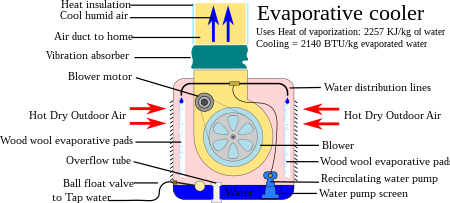Evaporative Cooling Types:
1. Evaporative Coolers:
There is many names for this coolers (outdoor air coolers, Evaporative air coolers, swamp coolers or desert coolers)

Direct Evaporative coolers (DEC)
How it works: Main stream of air passing throw wet evaporative media
Advantages: Low-cost, easy to maintain, hug amount of air flow, very low power consumption
Disadvantages: very poor performance in humid climate
Theoretical efficiency: 90%
Practical Efficiency 75-85%
Indirect evaporative coolers (IEC)
How it works: first stream of air passing throw wet media cooling down the water, second stream (supply air) will be pre-cooled with indirect ouch with the cold water (or heat exchanger)
Advantages: little tricky maintain, no humidity added to supply air
Disadvantages: very poor performance in humid climate, less efficient than direct evaporative coolers
Theoretical efficiency: 70%
Practical Efficiency 50-60%
*Coolerado Claims Efficiency of 110% using Mass heat exchanger technology
Indirect-direct evaporative coolers (IDEC)
How it works: first stream of air passing throw wet media cooling down the water, second stream (supply air) will be pre-cooled with indirect touch with the cold water (or heat exchanger) then it will pass throw the second stage evaporative media
Advantages: very high efficiency, good performance in humid climate
Disadvantages: little tricky to maintain, smaller amount of air flow, expensive.
Theoretical efficiency: 135%
practical Efficiency 112-127%
Hybrid evaporative coolers:
How it works: Main stream of air passing throw wet evaporative media then via DX (or chilled water coil)
Advantages: ability to control the supply air temperature
Disadvantages: power consumption is higher, but still much less than traditional compressor based systems
2. Fan and pad systems:
How it works: widely applied in poultry and green houses , evaporative media will be installed on one side of the greenhouse and fans on the opposite side, this fans will generate suction pressure sucking air via the wet pads
Advantages: Low-cost, easy to maintain, hug amount of air flow, very low power consumption
Disadvantages: very poor performance in humid climate
Theoretical efficiency: 80%
Practical Efficiency 60-70%
3. High pressure Misting system (water fog/fogging system) :
It’s another type of evaporative cooling, the system is based on very high pressure 70 bar water pump (while normal water tap pressure is 3 bar max) spraying water via very small orifice nozzles (0.1-0.3MM)
this will produce very fine drops of water (5-15 micron) it will look like fog and evaporate very fast while traveling in air at distance of 1-2 meters max
Advantages: very high efficiency almost achieving the wet-bulb temp
Disadvantages: very expensive, nozzles get blocked easily, need very clean treated water.
Note: some systems on the internet valuable for couple of hindered of dollars promoted as “high pressure misting system” most of them have pressure less than 5-10 bar, they will just spray water and get everything wet , high pressure misting systems with just 10-15 nozzles prices start with minimum 1500$ +
Water pressure 50-70 bar
Theoretical efficiency: 100%*
Practical Efficiency 85-95%*
*Based on system sprays 5 milliliter of water mist for every cubic meter of air
*Water pressure 60 Bar
*nozzle orifice 0.25mm
Cooling towers:
Theoretical efficiency: 80%
Real life Efficiency 50-60%
Need Outdoor air coolers rental service in Dubai ?